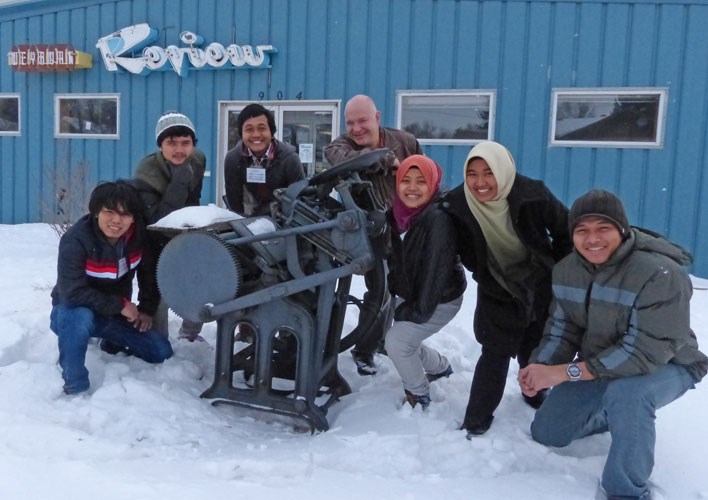For the last five years, the programs at HELP International have helped train university students from Malaysia.
For the last five years, the programs at HELP International have helped train university students from Malaysia.
Through the hands-on experience at HELP International, the students gain valuable experience for their studies, plus they get to experience the Canadian culture for themselves.
The most recent intake of students will be leaving in January, after completing their research programs. They shared their favourite things about working at HELP International and getting to spend time in Weyburn.
Ahmad Mustapha Mohamad Pazi was researching the growth rate of the American Elm, using many different methods of light saturation and watering, with the common theme of planting seedlings into Styrofoam blocks.
This was Ahmad's first time in Canada, and really enjoyed working in Weyburn. "HELP International is the one organization that focuses their purpose for improving the environment and education."
His main job at HELP was as a food and accommodation manager and zero waste manager. "When I arrived, I met Rodney. He is an awesome boss, he trained us and supervised us. He taught us how to manage our job and our tasks."
"I learned how to manage myself and finish my work. There were many programs for zero waste management and tree planting. We were able to share our experience," said Ahmad.
Through his research, a new method of protecting elm trees was discovered, through using the Styrofoam blocks. He had trees watered in both the floating nursery and open garden.
Muhammad Saufi Samsudin researched comparing growth performances of willow trees in three different planting systems and conditions. He also worked as a safety manager and maintenance manager.
"I enjoyed the challenge and all the work, everything we have done was a new thing for me," said Saufi. "I enjoyed the people and the culture. We got to interact with the landowners, the community and the students."
He found the weather to be the most challenging aspect, especially the winter. All of the other Malaysian students agreed that it was a challenge to adjust to the winter temperatures.
For the first time at HELP International, they used an open pond during research, and Saufi had an opportunity to compare willow species watered through an open pond to those who were in the floating nurseries.
Muhammad Syafiq Musa researched the growth of different variety of poplar trees from the floating nursery at HELP International. He also worked as a logistic manager.
"I really liked the hands-on learning at HELP," said Syafiq. He noted that it was an opportunity he wouldn't have had at his university. "They really trusted in us to do the job."
"The people in Weyburn were very nice to us, they greeted us even when we didn't know them. This is something that we lack in our own culture," said Syafiq.
Saidah Mardhiah Mohd Izraai researched the production of tomatoes on cultivated and non-cultivated soils. She also was the field forestry manager.
"The field forestry research really related to what I am learning at university," said Saidah.
"Also, our mission at HELP is about less cost, but also helping to create more production."
"I like to interact with the HELP customers, and ask them about Canada and the weather," said Saidah. She also enjoyed learning about Canadian agriculture and visiting larger farm operations around the province.
"We learn about different technologies in agriculture, to make a different between Malaysia and Canada."
Her research on drought conditions for tomatoes resulted in a different result than expected.
They had hoped a longer root would produce more tomatoes, but it was actually the shallow commercial-cut that produced a more hardy tomato.
Salisa Mulira Bt Awang Hamat compared all the tree varieties in the floating nurseries. She was also the finance and administration manager and research manager.
"I really enjoyed the responsibility we were given at HELP," said Salisa. "At school internships, we have our leader, but here we need to take that responsibility 100 per cent.
We need to be leaders and be alert."
Spending time in Weyburn also really helped Salisa to learn more English. Before coming to HELP International, she was really scared to speak English, but left feeling more confident.
A number of tree varieties did very well in the floating nursery, such as the sandcherry, rose, green popular, spruce and oak.
Mohd Azrul Salleh Putin compared tree and weed growth between two different mulch bags, one made from grain bags and the other from commercial semi-molter tire shredding. He was also a tree production manager and social and training events manager.
"The thing I liked the most about being in Saskatchewan was all the grain fields," said Azrul. "I also really liked the people and respect their manners."
"At HELP International I learned so much about grain technology and management of our own portfolios," said Azrul. "We learned a lot in five months, but we are still learning.
Rodney helps us so much, and trains us from zero to something that can be an asset to people."
"The great thing is that we learn the technology and we become a researcher," said Azrul. "There are a lot of different agricultural technologies in Canada than compared to Malaysia."
Through his research, Azrul discovered that the grain bags were much better mulch for the trees, when compared to the tire shredding. There were very few weeds that grew with trees covered with mulch coverings made from the white grain bags.
HELP's principal mission is to train, mobilize, and partner with prairie residents in leading edge strategies in ecology, applied research, and problem solving on the landscape with farmers and municipalities.
For many years there was a focus on African programs at HELP International, but for the last five years there was a focus on Asian students through the agreement with the Malaysian universities.
